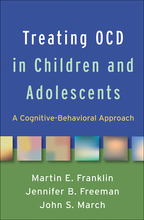Treating OCD in Children and Adolescents
A Cognitive-Behavioral Approach
Martin E. Franklin, Jennifer B. Freeman, and John S. March
“Eschewing the session-by-session framework common to many treatment manuals, Franklin and colleagues utilize a clinically fluid approach to translate their decades of research into an incredibly valuable resource for practicing clinicians, clinical educators, and trainees. Highly accessible and engaging, the book not only provides detailed instructions for administering the treatment, but also helps clinicians navigate the unpredictable situations that invariably arise in child and family therapy. Replete with rich case examples, sample dialogues, and clinical pearls, this is an absolutely essential book for anyone working with youth suffering from OCD and their families.”
—John C. Piacentini, PhD, ABPP, Director, Childhood OCD, Anxiety, and Tic Disorders Program, UCLA Semel Institute for Neuroscience and Human Behavior
“A 'must-have' guide for any clinician who works with youth. It is based on the authors' thousands of hours of experience implementing the treatment, which can be used in any professional setting. Most importantly, the authors bring the treatment to life through invaluable case examples and detailed excerpts of dialogue with patients. Difficult clinical situations and their solutions are described, preparing the therapist to deal with typical dilemmas. I’m confident that this book will become as tattered and dog-eared as March and Mulle's earlier seminal volume.”
—Kevin D. Stark, PhD, Department of Educational Psychology, The University of Texas at Austin
“One of the great success stories in child and adolescent psychiatry has been the development of an effective treatment approach for OCD. This book continues to push progress in this area by giving clinicians a manual that enhances family engagement and can be used across multiple settings. It incorporates research and clinical advances gained over the past 20 years to present a nuanced person- and family-centered intervention framework. The authors provide a strong theoretical rationale for exposure-based treatment and use an effective climbing metaphor to describe an approach that is sensitive to the client’s progress and flexible to the needs of the setting. I found the chapter on involving families in treatment to be particularly impactful.”
—Douglas W. Woods, PhD, Department of Psychology, Marquette University
“Treating OCD in Children and Adolescents skillfully presents the advancements in research and clinical practice that have amassed since the publication of March and Mulle’s classic 1998 work on the topic. This wise, reader-friendly book is an accessible tool for graduate student trainees, novice therapists, and OCD specialists alike. It is a theory-driven yet practical guide that exemplifies flexibility within fidelity, as illustrated by its focus on realistic therapist–client exchanges and common clinical challenges.”
—Daniela Colognori, PsyD, Clinical Director, Tourette Syndrome Clinic, Rutgers, The State University of New Jersey; private practice, Short Hills, New Jersey
Table of Contents
I. What Do We Know about OCD?1. Clinical Presentation and Comorbidity
2. Theoretical Underpinnings—Conceptual Models
3. What Does the Empirical Literature Tell Us about Treatment?
4. Being the Best Guide You Can Be
II. Setting Up Treatment
5. Psychoeducation for Patients and Families
6. Hierarchy Development and Functional Analysis
7. Involving Families in Treatment: A Developmentally Sensitive Approach
8. Thinking about Thinking
9. Response Prevention Instructions
III. The Exposure Hierarchy
10. Early Exposures
11. Intermediate Exposures
12. Summiting: Peak Exposures
13. Relapse Prevention
14. Boosters/Fading
IV. Special Issues
15. Specific Family Issues
16. Partial Response and Nonresponse: What's a Therapist to Do?
17. OCD Treatment and Engaging Schools, with David McConville
Appendix. Reproducible Handouts
About the Authors
Martin E. Franklin, PhD, is Associate Professor of Clinical Psychology in Psychiatry at the University of Pennsylvania School of Medicine, where he is also Director of the Child and Adolescent Obsessive–Compulsive Disorder (OCD), Tic, Trichotillomania, and Anxiety Group. Since the 1990s, Dr. Franklin has conducted research on psychopathology and treatment response in individuals with anxiety and related conditions across the developmental spectrum. He has lectured nationally and internationally on OCD, trichotillomania, Tourette syndrome, and related disorders. Dr. Franklin is also Clinical Director of Rogers Behavioral Health–Philadelphia, where he oversees partial hospitalization and intensive outpatient programs for anxiety/OCD and depression in youth.Jennifer B. Freeman, PhD, is Director of Research and Training at the Pediatric Anxiety Research Center at Bradley Hospital and Associate Professor (Research) of Psychiatry and Human Behavior at the Warren Alpert Medical School of Brown University. Her research focuses on child and adolescent anxiety disorders, with particular interests in obsessive–compulsive disorder, cognitive-behavioral family interventions, and developmental psychopathology. Dr. Freeman's current research focuses on dissemination of treatment and training programs for treatment providers in the area of exposure therapy.
John S. March, MD, MPH, is former Director of the Division of Neurosciences Medicine at the Duke Clinical Research Institute. He has extensive experience developing and testing treatments for pediatric mental disorders and has published widely on obsessive-compulsive disorder, posttraumatic stress disorder, anxiety, depression, attention-deficit/hyperactivity disorder, and pediatric psychopharmacology.
Contributors
David McConville, PhD,The Warren Alpert Medical School, Brown University, Providence, RIAudience
Clinical child/adolescent psychologists, counselors, social workers, and psychiatrists.Course Use
May serve as a supplemental text in graduate-level courses.Previous editions published by Guilford:
First Edition, © 1998
ISBN: 9781572302426
